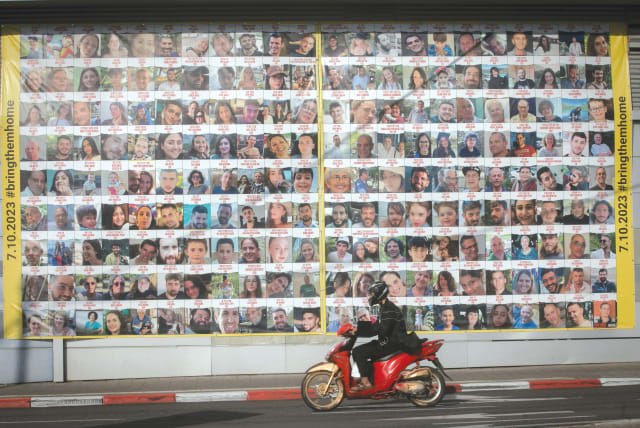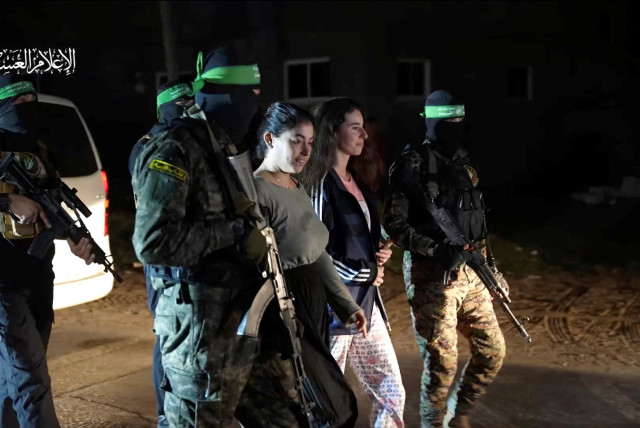My Word: Security and solidarity

I’d rather belong to a nation willing to wage war and pay a price to bring home a collective child than to identify with a would-be country that teaches its children to worship the cult of martyrdom.
It’s a cliché and a truism. The phrase “Kol Yisrael arevim zeh lezeh” – all Israel is responsible one for the other – has been on my mind since the October 7 Hamas and Islamic Jihad mega-atrocity. It’s something our enemies both admire and exploit.
When arch-terrorist Saleh al-Arouri was eliminated in Beirut earlier this month, among the extensive news coverage was a chilling excerpt from an interview he gave to Gal Berger, a senior journalist at the KAN public broadcasting company (then the IBA).
They spoke shortly after the 2011 Gilad Schalit deal, in which more than 1,000 Palestinian prisoners were released from Israeli jails in return for the low-ranking IDF soldier. Arouri had been intensely involved in the deal, conducted via Egyptian negotiators.
In a phone interview from Damascus, Arouri spoke in Hebrew, which he had learned during his many years in Israeli prisons. He clearly had learned more than just the language. The convicted terrorist had picked up on essential aspects of the national character and psyche.
Paying a heavy price
“Every time that Israelis see one person, one civilian, or one soldier, as important enough to pay a heavy price to return him to his family, this means that the society and state have the correct understanding of the hearts of its people,” Arouri told Berger. “This is a point of strength of Israeli society. And I say this to all our people, also within Hamas. When a country is prepared to wage war for one soldier and to free 1,000 prisoners for one person, it is a positive thing.
“I, as a person on the other side, the side of the enemy, it would be better for me – I would be happy – if Israelis reached the situation in which they didn’t care about one soldier or one civilian.”
Arouri explained that it would make him happy because it “would weaken the Israeli society and military.”
AROURI, LIKE his terrorist peers and Iranian backers, prefers to see the fabric of Israeli society being torn apart. Fortunately, when it comes to Hamas hostage-taking, that part of his plan has so far failed.
The kidnapping and murder of the three teens in the summer of 2014 – also the work of Arouri – united the country during the three-week search operation aptly called Operation Brother’s Keeper. It was a unity that served us well during the subsequent weeks of war that hot summer as soldiers bravely fought in Operation Protective Edge in Gaza and thousands of rockets rained down on both the North and South of the country.
Arouri was also among the Hamas masterminds of the October 7 invasion, with its mass murder of more than 1,200 and the abduction of some 240. Given the huge divide in Israel at the time over the government’s judicial reform plan, and the response to it, Arouri probably thought his dream had come true: Israeli society and the military seemed to be tearing themselves to pieces, with some members of the elite forces – including some pilots and reservists in intelligence units – threatening to refuse to serve.
As we saw, however, when attacked, Israel pulled together. It’s a characteristic of families – they can say what they like among themselves, but woe to those who attack them from outside the family. Also, nobody was under any illusion about what was at stake. The entire country was being threatened in the war with terrorists.MANY YEARS ago, I was quoted by a Hezbollah-affiliated news agency. It gloated over a report I had written about a Knesset Foreign Affairs and Defense Committee meeting in which some MKs had openly shed tears while discussing the Shayetet 13 disaster. Eleven members of the elite naval unit had been killed in an ambush in 1997 while on a mission. Hezbollah saw the MKs’ tears as a sign of weakness, not solidarity.
There’s another Israeli trait that Arouri’s ilk probably equally admire and despise. Early in the current war, First Lady Michal Herzog mentioned in a radio interview that she had a son in active service in Gaza. The interviewer sympathized with the president’s wife; she was in the same situation.
Gadi Eisenkot, a former chief of staff and member of the war cabinet, last month lost both his son and a nephew within days in Gaza. When he took part in strategic decision-making, Eisenkot was well aware that it could affect his own loved ones.
Singer-actor Idan Amedi – a star of the action series Fauda – was seriously wounded while serving as a reservist in Gaza this week. In the social media era, bad news spreads with lightning speed – and hits like lightning, too. Here was a name and face millions recognized. And there aren’t many countries where, in real life, stars don uniforms and participate in combat.
Later, the names of other soldiers killed and wounded on the same day were released for publication – each one striking the hearts of friends and family, but also touching complete strangers.
The sight of a neighborhood turning out with blue-and-white flags as the family of a fallen soldier is driven to the military cemetery is now so common, that it is almost part of the funeral ceremony. Whether or not we know the soldier, whether or not we have heard their special story, we feel a connection.
Israel is a small country. We all know someone who knows someone. Every death, every fallen hero or heroine, is personal.
THE SAME can be said for the hostages, 136 of whom remain captive in Gaza. The posters with their names and faces can be seen everywhere. It is the greatest fear of the families that they will be abandoned or forgotten: the young, the old, the men, and the women.
The Histadrut (Israel’s national trade union) has announced a 100-minute general strike on Sunday, 100 days since October 7. It is calling for increased efforts for the return of the captives. Not for the first time, however, I fear the politicization of the hostage issue.
The fate of the hostages is a national trauma. Nobody wants a repeat of the situation of IAF navigator Ron Arad, whose disappearance in Lebanon in 1986 remains an open wound. And there are other MIAs, whose names are less familiar to the public but whose families also deserve closure.
The British Daily Mail this week released “before and after” photos of four teenage female IDF soldiers being held in Gaza – their beautiful faces are seen bloody, bruised, and with a haunting traumatized look. They could be anyone’s sister or daughter or friend, as their parents noted in their plea for more international pressure to bring them home.
Kfir Bibas, a baby with striking ginger-colored hair and a smile that lights up the world, turns one year old next week. It is almost unfathomable that he has spent a quarter of his first year of life amid the darkness and deprivation of captivity, along with his four-year-old brother, Ariel, and his mother, Shiri. Hamas has informed his father, Yarden, also being held hostage, that his family is dead, but there is so far no way of knowing if this is true or a tactic in Hamas’s evil psychological warfare.
The Hamas members in Israeli prisons – in vastly better conditions than the hostages in Gaza, and with regular Red Cross visits – are terrorists. There is no reason to believe they have become peace-loving members of the global village rather than supporters of global jihad. Their release in return for the hostages who were brutally abducted on October 7 will not make the world a safer place.
The dilemmas surrounding a deal that could free the hostages, but possibly endanger soldiers and Israeli citizens further down the line, are tremendous and heartbreaking, but one thing I know for sure: I’d rather belong to a nation willing to wage war and pay a price to bring home a collective child than to identify with a would-be country that teaches its children to worship the cult of martyrdom and turns its mass murderers and child-killers into heroes.
And we shouldn’t grant arch-terrorist Arouri the posthumous satisfaction of seeing Israel dangerously splintered rather than standing together in powerful solidarity.
Jerusalem Post Store
`; document.getElementById("linkPremium").innerHTML = cont; var divWithLink = document.getElementById("premium-link"); if (divWithLink !== null && divWithLink !== 'undefined') { divWithLink.style.border = "solid 1px #cb0f3e"; divWithLink.style.textAlign = "center"; divWithLink.style.marginBottom = "15px"; divWithLink.style.marginTop = "15px"; divWithLink.style.width = "100%"; divWithLink.style.backgroundColor = "#122952"; divWithLink.style.color = "#ffffff"; divWithLink.style.lineHeight = "1.5"; } } (function (v, i) { });

